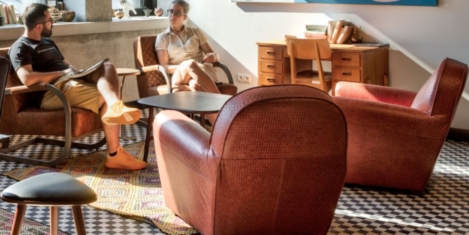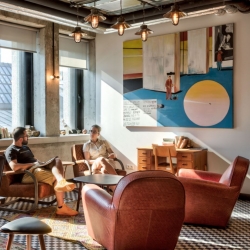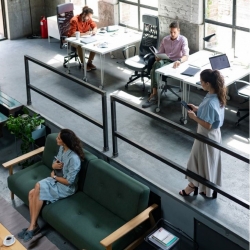To provide the best experiences, we use technologies like cookies to store and/or access device information. Consenting to these technologies will allow us to process data such as browsing behaviour or unique IDs on this site. Not consenting or withdrawing consent, may adversely affect certain features and functions.
The technical storage or access is strictly necessary for the legitimate purpose of enabling the use of a specific service explicitly requested by the subscriber or user, or for the sole purpose of carrying out the transmission of a communication over an electronic communications network.
The technical storage or access is necessary for the legitimate purpose of storing preferences that are not requested by the subscriber or user.
The technical storage or access that is used exclusively for statistical purposes.
The technical storage or access that is used exclusively for anonymous statistical purposes. Without a subpoena, voluntary compliance on the part of your Internet Service Provider, or additional records from a third party, information stored or retrieved for this purpose alone cannot usually be used to identify you.
The technical storage or access is required to create user profiles to send advertising, or to track the user on a website or across several websites for similar marketing purposes.
 Employee engagement levels may have actually improved during the COVID-19 pandemic, claims a recent survey undertaken by intermediary Howden Employee Benefits & Wellbeing. (more…)
Employee engagement levels may have actually improved during the COVID-19 pandemic, claims a recent survey undertaken by intermediary Howden Employee Benefits & Wellbeing. (more…)








 The pandemic and months of Zoom calls and remote work have begun to wear on us, so much so that in
The pandemic and months of Zoom calls and remote work have begun to wear on us, so much so that in 
 It was in the summer of 2020 that conversations about a second pandemic of mental health issues first started. As we began to see and feel our mental health suffering due to the ongoing impact of COVID19, this idea gained momentum and interest within business sectors. This concept has also been leapt upon by health and wellbeing consultants everywhere as they whip up a storm discussing the inevitable wave of mental health issues threatening to engulf our employees in the future.
It was in the summer of 2020 that conversations about a second pandemic of mental health issues first started. As we began to see and feel our mental health suffering due to the ongoing impact of COVID19, this idea gained momentum and interest within business sectors. This concept has also been leapt upon by health and wellbeing consultants everywhere as they whip up a storm discussing the inevitable wave of mental health issues threatening to engulf our employees in the future. 
 A review of research in organisational and workplace psychology conducted by an international team of academics claims that working from home has been more disruptive for women than men. The review paper, entitled
A review of research in organisational and workplace psychology conducted by an international team of academics claims that working from home has been more disruptive for women than men. The review paper, entitled 
 Avison Young, realestateworks and HLM Architects have launched
Avison Young, realestateworks and HLM Architects have launched 
 With the continuous impact of the pandemic on people’s mental health due to isolation, work uncertainty, and anxiety over health, the topic has been dominating the news, begging the question of how we can achieve accessible and cost-effective treatment for all and prevent the expected acceleration of mental health issues in the coming months. As we juggle a different type of work-life balance brought about by working from home and the added worry of how the pandemic is affecting us, there is no doubt that our daily lives have been disrupted. The statistics are alarming;
With the continuous impact of the pandemic on people’s mental health due to isolation, work uncertainty, and anxiety over health, the topic has been dominating the news, begging the question of how we can achieve accessible and cost-effective treatment for all and prevent the expected acceleration of mental health issues in the coming months. As we juggle a different type of work-life balance brought about by working from home and the added worry of how the pandemic is affecting us, there is no doubt that our daily lives have been disrupted. The statistics are alarming; 
 Research published by
Research published by 
 New research from absence intelligence company
New research from absence intelligence company 
 A December 2020 online study of 1,136 employed U.S. adults carried out by wellbeing provider
A December 2020 online study of 1,136 employed U.S. adults carried out by wellbeing provider 
 The number of companies monitoring their employees is growing. According to a Gartner survey, more than 22 percent of employees use employee movement data, while 17 percent of them are monitoring computer usage. With companies choosing to monitor employees, privacy laws are also catching up, and thus there is a need for explaining employee monitoring to prospective hires. Employee monitoring is defined as the use of monitoring devices and methods by companies to learn about their employees’
The number of companies monitoring their employees is growing. According to a Gartner survey, more than 22 percent of employees use employee movement data, while 17 percent of them are monitoring computer usage. With companies choosing to monitor employees, privacy laws are also catching up, and thus there is a need for explaining employee monitoring to prospective hires. Employee monitoring is defined as the use of monitoring devices and methods by companies to learn about their employees’ 







January 13, 2021
Office design will respond to the events of the past year as it always has – by getting better
by Oliver Ronald • Comment, Workplace design